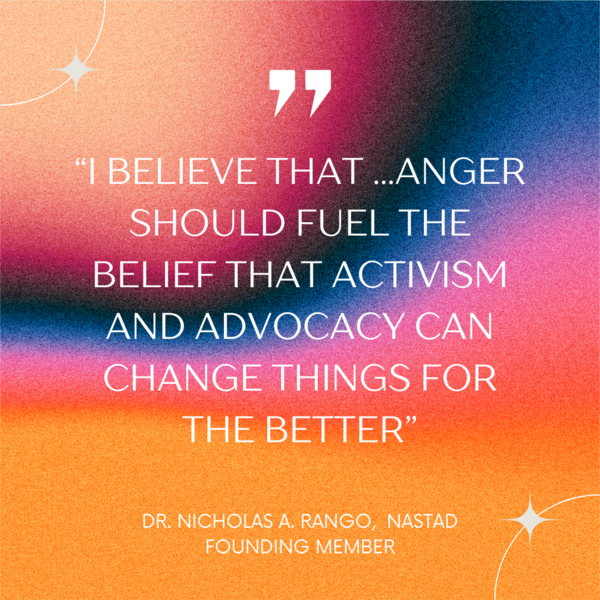
Celebrating Pride and the Ongoing Legacy of AIDS Activism
For the LGBTQ+ community, June is a month of celebration. Pride month is an occasion to raise and amplify our voices, struggles, and triumphs. It is a time to celebrate the beauty and resilience of our community, but it is also an opportunity to reflect, mourn, and organize. The first Pride marches took place on June 28, 1970 to commemorate the first anniversary of the Stonewall Uprising. Significant gains have been made in the movement for LGBTQ+ liberation in the decades since, but we cannot take that progress for granted. As we close out this month with festivities across the nation, we must keep sight of the activist origins of Pride and mobilize to keep our communities safe in a hostile socio-political climate that is unjustly targeting the LGBTQ+ community.
The Stonewall riots were the catalyst for the first Pride celebrations and a transformative shift in LGBTQ+ activism: community members fought back, made themselves visible, and collectively resisted their disenfranchisement. The tactics used by activists at the height of the AIDS crisis can be seen as an outgrowth of that radical tradition. Faced with government inaction, widespread stigma, and indifference to the needs of the sick and dying, the community organized to fight back and care for one another. Righteous anger, driven by love, has been essential to our advocacy and survival. Through grassroots organizing and direct action, activists forced leaders to recognize the AIDS crisis, transformed the institutional response to the epidemic, and laid the foundation for the work that continues today.
We stand on the shoulders of giants like Cecilia Gentili, Marsha P. Johnson, Sylvia Rivera, the members of the AIDS Coalition to Unleash Power (ACT UP) and countless others who demonstrated extreme bravery and tenacity in their fight for justice. They exemplified the ways that disenfranchised people can seize power and create change, and we must honor their activist legacies by continuing to do the same. At NASTAD's 1993 Annual Meeting, Dr. Nicholas Rango, one of our founding members, beautifully described the role of righteous anger and direct action in advocating for progress:
“I believe that that anger should fuel the belief that activism and advocacy can change things for the better …and I want to urge you (AIDS directors), that you’re not angry enough. You are the protectors. If it is not for you, people with AIDS are going to go down the tubes. We’re not a bunch of bureaucrats, and if we are, we should move on. We are self-selected because we want to make a difference in this epidemic. People living with AIDS and those at risk need you. They don’t need you to be nice, all the time, and they don’t need you to be polite, all the time. They need you to be tough, when you have to be, and they need you to be unyielding, when you have to be, and they need you to be decisive in deciding how this damn epidemic has gotta be controlled. Because I believe you guys got the expertise – nobody else, not higher not lower. But it is not going to work if you see yourself as somehow free of conflict … with agencies like AIDS Action, with CDC or anyone else. Our credibility as an organization will be directly proportionate to the degree to which that advocacy and activism is perceived by other audiences.”
The institutional and ideological hostility currently facing the LGBTQ+ community mirrors the early days of the crisis. In the face of ongoing stigma, a years-long pandemic, and attacks on reproductive rights, gender-affirming care, and the values of diversity, equity, and inclusion, the activism and decisiveness that Dr. Rango called for remains paramount.
Public health owes so much to the legacy of AIDS activism. We have a rich history of direct action and strident organizing to guide our advocacy. This work continues in the hands of movement leaders like Ceyenne Doroshow, an outspoken activist and pillar of New York’s trans community. She is the founder of Gays & Lesbians Living in a Transgender Society (G.L.I.T.S) and is working to raise 1 million dollars for direct services after a significant loss of funding due to transphobic backlash in the aftermath of Cecilia Gentili’s memorial service. ACT UP is still actively organizing and their hybrid meetings are open to all.
We must center the needs and voices of marginalized people, learn from past mistakes, and mobilize to ensure their health, safety, and liberation. Click through the links below to discover relevant NASTAD resources, learn about the history of AIDS activism, and explore tangible ways to support the LGBTQ+ community.
Historical Resources:
- ACT UP Oral History Project
- At the Club: Locating Early Black Gay AIDS Activism in Washington, D.C.
- To Make the Wounded Whole: The African American Struggle against HIV/AIDS
- Let the Record Show: A Political History of ACT UP New York, 1987–1993
- Hold Tight Gently: Michael Callen, Essex Hemphill, and the Battlefield of AIDS
NASTAD Resources:
- Statement: Trans Rights are Human Rights
- Virtual Learning Series on Transgender and Gender-Diverse Health
- Talking Points: The Resource Guide for Facilitating Stigma Conversations
- Addressing Stigma: A Blueprint for Improving HIV/STD Prevention and Care Outcomes for Black & Latino Gay Men
- Trauma-Informed Approaches Toolkit
- HIV Criminalization Resources
Ways to Support:
- Donate to G.L.I.T.S, a Black trans-led advocacy and direct service organization that provides housing, healthcare, crisis support, wellness, public education, harm reduction, end-of-life support, and so much more.
- Join an ACT UP meeting (via Zoom)